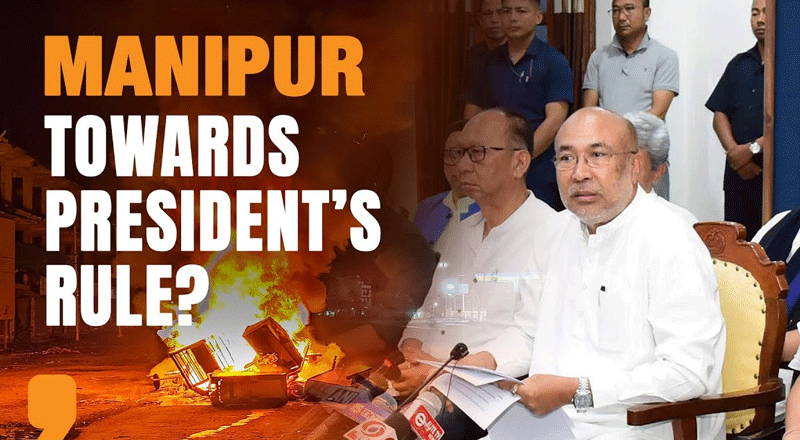
President’s Rule Imposed in Manipur: Ethnic Unrest, Political Fallout, and Government Response
Manipur has been grappling with ethnic violence between the Meitei and Kuki communities, which escalated following a court ruling regarding the Meitei community's inclusion in the Scheduled Tribes list. This unrest, spanning nearly two years, led to significant political turmoil, culminating in the resignation of Chief Minister N Biren Singh and the subsequent imposition of President’s Rule in the state. Background of the Ethnic Violence The conflict between the Meitei and Kuki communities intensified on May 3, 2023, after a rally organized by the All-Tribal Students Union of Manipur (ATSUM). The rally was in response to a Manipur High Court order directing the state government to consider the Meitei community’s inclusion in the Scheduled Tribes category. The ensuing violence led to large-scale displacement, destruction of property, and heightened tensions between the two ethnic groups. Despite multiple interventions by the state and central governments, peace remained elusive. The state administration struggled to control the violence, leading to criticism from various quarters. The unrest severely impacted daily life, prompting calls for stronger governance measures. Biren Singh’s Resignation and Political Developments Amid rising political pressure and inability to fully control the crisis, Manipur Chief Minister N Biren Singh resigned from his position. On February 9, 2024, he tendered his resignation to Governor Ajay Kumar Bhalla at the Raj Bhavan in Imphal. Singh was accompanied by 14 MLAs from the BJP and NPF, along with state BJP president A Sharda and senior party leader Sambit Patra. In his resignation letter, Singh acknowledged the central government's role in developmental efforts and safeguarding the interests of the Manipuri people. He expressed gratitude for the opportunity to serve and indicated his willingness to facilitate a peaceful transition of power. His decision came just days after a no-confidence motion was set to be introduced by the opposition Congress in the Assembly session on February 10. Imposition of President’s Rule Following Singh’s resignation, political uncertainty loomed as the ruling Bharatiya Janata Party (BJP) struggled to reach a consensus on his replacement. Given the deteriorating law and order situation and the absence of a clear leadership alternative, the central government imposed President’s Rule in Manipur. The imposition of President’s Rule meant that the state's administrative affairs would now be directly overseen by the central government. This move was met with mixed reactions—while some saw it as a necessary step to restore stability, the opposition viewed it as an attempt to suppress democratic processes and avoid the no-confidence motion. Opposition's Criticism and Demand for Accountability The opposition Congress was vocal in its criticism of the BJP government’s handling of the crisis. Congress MP Jairam Ramesh pointed out that the imposition of President’s Rule was a direct consequence of the government’s failure to control the violence and maintain political stability. “The Congress was bringing a no-confidence motion on February 10. They knew the chief minister had lost the confidence of even his own BJP and NDA colleagues. Within six months from the previous session to the next, a session must be held, which was violated. Now, President’s Rule has been imposed. We will discuss internally whether to demand midterm polls, but for now, we insist that the Prime Minister must visit Manipur,” Ramesh stated. The opposition has also called for an immediate resolution to the ethnic conflict and greater transparency in the governance of Manipur. The demand for fresh elections remains a contentious issue, with political parties weighing their options. Government’s Strategy Moving Forward In response to the political crisis, the BJP’s northeast in-charge, Sambit Patra, conducted a series of meetings with ministers, MLAs, and party leaders to discuss the way forward. The party is actively seeking a consensus on a new legislature party leader to replace Singh and lead Manipur through this challenging period. Additionally, efforts are being made to restore normalcy in the state by strengthening security measures and initiating peace talks between warring factions. The central government has also assured that governance and developmental work will continue despite the political turmoil. In conclusion, we can say that the ongoing ethnic violence in Manipur and the subsequent resignation of CM Biren Singh have highlighted significant governance challenges. While the imposition of President’s Rule aims to bring stability, the opposition’s criticism underscores concern regarding the handling of the crisis. Moving forward, the state requires a balanced approach—one that prioritizes peace and reconciliation while ensuring that democratic institutions function effectively. The resolution of the ethnic conflict and a roadmap for political stability will be crucial in determining Manipur’s future trajectory. (With inputs from agencies)








